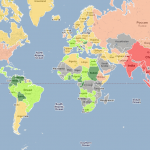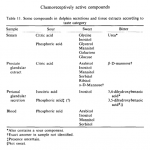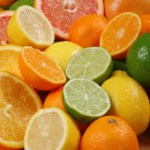
Remember how I sang that awesome evolution rewrite of that song for open mic night at Science Online 2011?
No?
Oh, I see. You weren't at Science Online 2011. Or, worse, you were, but you missed my stellar performance. No worries - I've been strong-armed into turning it into a recording. Without further ado...
**UPDATE** Like it so much? Ok, fine. Go download it and add it to your iPod.
GoDaddy.com Chief Executive Bob Parsons feels absolutely no remorse for his choice to engage in elephant hunts in Zimbabwe. He posted this boastful video saying it's one of the most 'rewarding' things he does (warning - strong stomach required), and continues to defend it even after coming under fire for his actions.
Parsons had this to say about his hunts (this wasn't his first):
I spend a few weeks in Zimbabwe each year helping the farmers deal with problem elephants. The people there have very little, many die each year from starvation and one of the problems they have is the elephants, of…
I have to confess, when I saw a global map of average penis size flying around twitter, I was like a eighth grade boy finding his first nudie magazine - I couldn't help but take a peek. After a brief heart attack (it's in cm, not inches), my inner scientist started asking silly questions. You know, the kind of things that would only occur to a scientist when looking at a map of penis size like, "is this just a stochastic distribution?" "is there any reason why this pattern would occur?" and of course, "does penis size even matter from an evolutionary perspective?!"
Turns out that inner…
National Geographic has chosen two noble causes for this year's Expedition Granted. The one who wins will get $10,000 to help fight for the cause they are most passionate about. This is what Nat Geo has to say about the contestants:
For Dash, that means saving the population of monk seals from extinction. Today, less than 1 in 5 monk seal pups survive to adulthood. Despite this decline, there is one small population of monk seals in the Main Hawaiian Island that is thriving. Dash hopes to fully understand what has allowed this particular population of monk seals to succeed, and how this…
I was over at my friend Kira's house last night, having some wine and pizza and helping her relax before her PhD defense this afternoon. There was nothing abnormal about the evening at that point, though soon enough, that would change. Within the hour, we would first hear reports of a tsunami warning, the results of the fifth largest quake in recorded history off the coast of Japan. We would turn on the news and watch as the 13 foot waves rushed across Japanese crop fields. We'd watch in horror as cars were thrown about in raging floods and fires broke out in the water's wake. We'd look at…
To a biologist, there are only a few key elements that determine if something is alive: it must undergo homeostasis (stable internal state), metabolism (use energy to maintain organization and homeostasis), respond to its environment, adapt over time and reproduce. It sounds like a simple set of rules -- after all, a bacteria can do it. But we, as human beings, have never been able to capture such essence and truly bring machines to life.
But such is the quest of many computer scientists that seek to create "artificial life," or AI. The goal is to design a digital genetic code that can…
Hey fellow bloggers and fans of blogs! I'm happy to report that Tom Paine's Ghost has announced the return of the Post with the Most!
The contest rewards a $100 cash prize to the most powerful blog post. Posts are judged on their clarity, originality, integration (must contain at least three forms of media - text, photos, art, video, etc) and, of course, power - the post's ability to motivate readers.
My longer term blog followers know that I won this honor last year for my post on the Gulf Oil Spill. Now it's time for you (or your favorite blog) to take the prize! You can nominate your own…
Peta recently stirred up quite a lot of controversy with their banned superbowl ad claiming that "studies have shown that vegetarians are better lovers." Of course, no such research exists, but somehow in trying find where that came from (no pun intended) I ended up in a twitter conversation about diet and sex. Anyhow, to make a long story short, after several converstaional tangents I found myself sifting through the scientific literature for anything containing "taste" and "semen."*
Sorry, folks: there's no scientific study of the effects of diet on human semen flavor. But what I did find…
As you might have noticed, I've added a new badge to the left sidebar. That's right - you can start submitting posts for next year's Open Laboratory already! So find your favorite science blog posts from around the interwebs that were published in the past couple months and get submitting!
On a similar note, submissions are also open for the The National Academies Keck Futures Initiative Communication Awards. These awards are "designed to recognize, promote, and encourage effective communication of science, engineering, medicine, and interdisciplinary work within and beyond the scientific…
Sexual assault is no laughing matter - unless, of course, the would-be rapist isn't human. Who doesn't giggle when they see a small dog humping someone's leg? But what many people don't realize is that reverse bestiality - where an animal makes unwanted sexual advances on a person - is a true problem for scientists working in the field where the actions of wild animals are completely unpredictable.
Sure, sexual assault is embarrassing though tolerated when committed by a small, fluffy pomeranian with an overactive sex drive. Most people won't report the assailant to any kind of authority. It'…
Citrus fruits are delicious. Their delicate balance of sweetness and tartness is a biochemical masterpiece. It's no wonder that they, of all nature's tasty options, are the highest value fruit crop in terms of international trade, with over 105 million tons produced annually. But these tempting produce face a persistant villain that seeks to destroy their roots; a menace known, cleverly, as the citrus root weevil.
The weevil's grubby larvae feed like maggots on the vital roots of citrus plants. Native to the Caribbean, this crop-destroying pest wreaks havoc on citrus farms in Florida and…
"I am not a pretty girl - that is not what I do."
Ani DiFranco
A few weeks ago, I received a facebook message. It was from a male admirer of my blog (and his fiancée, coincidentally). In it, he said "You are GORGEOUS, and your tits look absolutely incredible." I froze. I know it was meant as a compliment, but it made me really uncomfortable. It was a sentiment that was much more muted in other comments I'd gotten. You know, ones like "wow, you're an amazing writer AND you're hot?" or "who would have thought a pretty girl could be so good at science?"Of course, if you point out to any of…
One of the most rewarding sessions I was a part of was "But it's just a blog!" run by Hannah Waters, Psi Wavefunction, Eric Michael Johnson, Jason Goldman, Mike Lisieski and Lucas Brouwers. The main question was: how do new bloggers get noticed and read in a sea of emerging science blogs? Furthermore, how do they get over the self doubt and "impostor syndrome" that keep them from feeling like they belong and become an important voice in the science blogosphere?
Coming into this session, I had to face my own impostor syndrome (or, as Emily best coined it, "I'm not Ed Yong" syndrome). As the…
If you believe the maxim "the more the merrier," then you would have LOVED the session which I am proud to say was my first as a moderator. I wasn't alone - nine other fantastic people worked with me. Our collective goal was to do the impossible: to give a complete 101 on how to explain science in blog posts. Everything from style and tone to content even website design and marketing. All of it. In one hour. And, might I say so myself, we totally rocked it.
This session took unconference to the extreme. Instead of having us stand up and talk at the audience, we split into five groups each led…
The ToBo Lab fish crew learning how to ID parrotfish from fish expert Rich Pyle aboard the Hi'ialakai
"Visual storytelling through science/nature photography" was the fourth session I attended at Science Online 2011. Run by ace photographer and journalist Allie Wilkinson and photography enthusiast and science writer Melody Dye, the session focused on how to enrich the public understanding of science through imagery. We often don't realize how important visual presentation is in communication. Whether in the form of a pic next to a headline or a photo essay, images are powerful means of…
When I was a child, I picked up a book called Last Chance to See. You've probably heard of the author - he's world renowned for his humorous science fiction which has secured his place in the hearts of geeks everywhere. But this book wasn't about travelling the universe with a trusted towel; it wasn't even fiction. It was the true story of what happens when you drag a witty, intelligent writer around with a nerdy biologist to encounter species on the brink of extinction.
Douglas Adams did more than just recount his travels around the world with Mark Carwardine. He brought conservation to…
As an avid lover of the outdoors, I was super excited to see that there was an entire session at Science Online 2011 dedicated to discussing technology's place in the wilderness.
All of the panelists are well versed in taking tech out of the city. Miriam Goldstein has used technology on multiple expeditions to study the Great Pacific Garbage Patch, taking the internet audience with her across the Pacific in search of trash. Danielle Lee is a passionate outdoor enthusiast, encouraging people in urban areas to experience the wilderness. Karen James is perhaps best known for her work with the…
This might sound narcissistic, but ever since some time early in high school, I've believed that someday, somehow, I will write a book. What kind of book keeps shifting as I grow up and my outlook on life changes, but the overall theory that I will eventually be an author has persisted. So of course, when I saw that there was a session about how to create "a popular science book: using the Web from the initial idea to pitching to writing to selling," I simply had to attend.
The session was moderated by blogging, book-writing superstars Brian Switek (Written in Stone), Sheril Kirshenbaum (The…
I arrived in North Carolina on Thursday night at around 6 pm. The next morning, I was barely coherent, after an amazing keynote speech, open mic night, and far too late an evening involving ocean bloggers and alcohol. I managed to cup some coffee, then make my way to my first blogging related event of the conference: "Death to Obfuscation: on the use of language in science writing" by none other than the power-packed duet of Ed Yong and Carl Zimmer.
It's hard to walk into a room containing these two brilliant writers and not feel a little self-conscious. They are, in the science blogging…
Trying to describe the experience of Science Online to someone who has never been is like trying to explain the taste of a pineapple. You can get vague details across - tangy, sweet, juicy - but the full experience can never be imparted verbally. I'm not even going to try to explain what it was like to be at this year's conference, but I do have some thoughts that have arisen out of four days of fantastic dialogue with new and old friends and, of course, excessive sleep deprivation.
I found there was a fascinating negative correlation between the amount of time the moderators spent talking…



